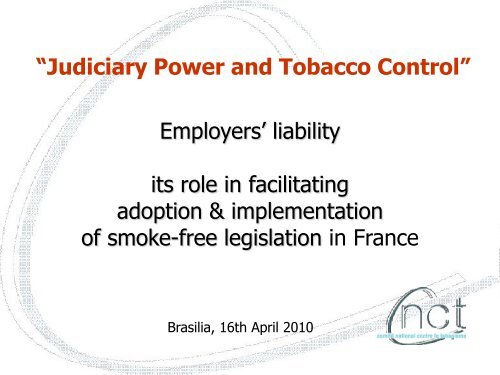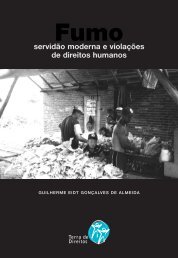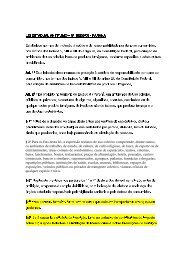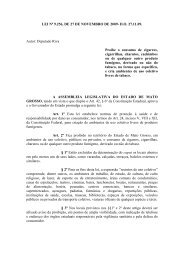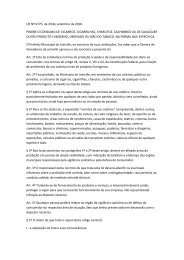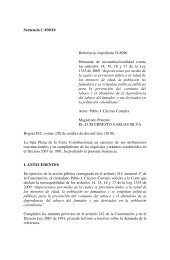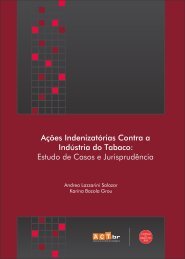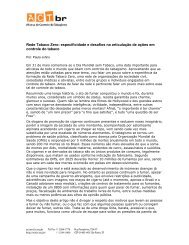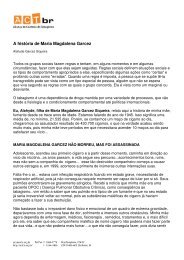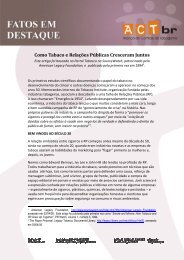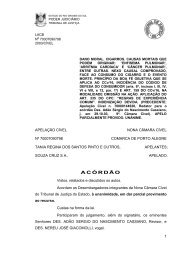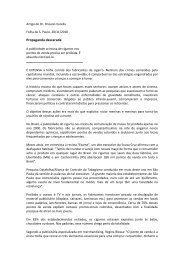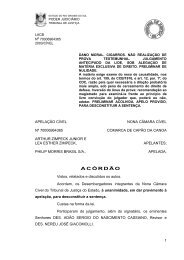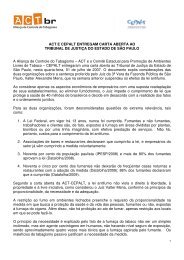Employers' liability its role in facilitating adoption & implementation ...
Employers' liability its role in facilitating adoption & implementation ...
Employers' liability its role in facilitating adoption & implementation ...
You also want an ePaper? Increase the reach of your titles
YUMPU automatically turns print PDFs into web optimized ePapers that Google loves.
“Judiciary Power and Tobacco Control”<br />
Employers’ <strong>liability</strong><br />
<strong>its</strong> <strong>role</strong> <strong>in</strong> facilitat<strong>in</strong>g<br />
<strong>adoption</strong> & <strong>implementation</strong><br />
of smoke-free legislation <strong>in</strong> France<br />
Brasilia, 16th April 2010
CNCT : National Committee<br />
for Tobacco Control<br />
NGO – French « ASH »<br />
Funded <strong>in</strong> 1868,<br />
Recognized as « act<strong>in</strong>g for the public <strong>in</strong>terest »<br />
One of our missions :<br />
Enforcement and improvement of the<br />
TC legislation<br />
c legal prevention - advocacy<br />
Brasilia, 16th April 2010
The French legal framework<br />
NGOs are allowed to file civil su<strong>its</strong> aga<strong>in</strong>st<br />
anti-smok<strong>in</strong>g law offenders :<br />
“The associations whose statutory goal<br />
<strong>in</strong>cludes the struggle aga<strong>in</strong>st tobacco,<br />
regularly registered for at least five years<br />
when the facts occurred, can become<br />
pla<strong>in</strong>tiffs and request punitive damages for<br />
the <strong>in</strong>fractions relevant to this act.”<br />
Ev<strong>in</strong> Law 1991<br />
Brasilia, 16th April 2010
Particularities and experiences from the<br />
French legal context<br />
- The consequence of a national tobacco<br />
monopoly for centuries<br />
- The way to compensate a lack of political will<br />
- Results : NGO built the strong jurisprudence / TC<br />
legislation<br />
Brasilia, 16th April 2010
French legal context<br />
- 1991 : Ev<strong>in</strong> Law<br />
« It is forbidden to smoke <strong>in</strong> all public places such as schools and<br />
public transport, unless an area has been reserved for smokers.<br />
An executive order will be issued by the Council of State sett<strong>in</strong>g<br />
out the conditions for <strong>implementation</strong> of the previous paragraph.»<br />
- 1992 : Enforcement decree<br />
- 2006 : New smoke-free decree<br />
- 1993-2006 : development of a progressive and strong<br />
jurisprudence<br />
Brasilia, 16th April 2010
The employer’s <strong>liability</strong><br />
Case Lefebvre c/ ACME Protection: the facts<br />
- Mrs Lefebvre, non smoker, worked <strong>in</strong> a collective<br />
office with smokers<br />
- Compla<strong>in</strong> / Employer<br />
c signs<br />
+ forbidden to smoke <strong>in</strong> the office <strong>in</strong> the<br />
presence of Mrs Lefebvre<br />
- No change<br />
c She dismissed and sued her employer<br />
Brasilia, 16th April 2010
The employer’s <strong>liability</strong><br />
Case Lefebvre c/ ACME Protection: the legal procedure<br />
- 26 March 2002 : Prud’Hommes, she lost<br />
- 24 April 2003 : Court of Appeal, she won for unfair<br />
dismissal – 3 340 Euros for damages.<br />
- 29 June 2005 : Court of Cassation confirmation :<br />
c the employer is obligated to protect employees<br />
from harm caused by passive smok<strong>in</strong>g,<br />
c obligation of results not simply of means
The result of a whole process<br />
Other rul<strong>in</strong>gs regard<strong>in</strong>g the protection toward passive smok<strong>in</strong>g :<br />
- 20 November 1996 : Case Ozeir, TGI Paris<br />
“Passive smok<strong>in</strong>g can be fatal”<br />
- 16 March 2004 : The right to leave, Court of Appeals Rennes<br />
Due to "poisonous nature of tobacco smoke (…) a lethal and<br />
dangerous product because of <strong>its</strong> carc<strong>in</strong>ogenic effects on<br />
both smokers and passive smokers" the employer "cannot<br />
force an employee (…) to work <strong>in</strong> a smoke-polluted<br />
atmosphere",<br />
furthermore, "an employee should not be reproached for<br />
refus<strong>in</strong>g to work <strong>in</strong> these conditions, especially given that<br />
he/she is only ask<strong>in</strong>g for compliance with a public health law
The result of a whole process<br />
The transposition <strong>in</strong> the national law<br />
of a European Directive<br />
/health and security at workplaces<br />
“The employer is not responsible only if it is <strong>in</strong><br />
un-normal, foreign and unforeseeable<br />
circumstances or exceptional events whose<br />
consequences could not be avoidable”. (see<br />
L 230-2 Labor Code)
The legal consequences<br />
1. A legal <strong>in</strong>security for employers<br />
- the possibility for an employee to break his/her work<br />
contract because his/her right for health is not<br />
respected<br />
- the possibility for an employee to use <strong>its</strong> right to<br />
leave<br />
- the risk to be faced to an “<strong>in</strong>excusable fault”<br />
- the risk of an <strong>in</strong>surance-related <strong>in</strong>security
The legal consequences<br />
2. A legal <strong>in</strong>security for employees<br />
A non smoker can sue not only his/her employer<br />
but also his/her colleague.<br />
A supervisor who would smoke or who let smoke<br />
someone could be implicated not at a discipl<strong>in</strong>ary<br />
level but at a civil level, and he/she could be<br />
condemned to pay possible damages as well.
The legal consequences<br />
3. A legal <strong>in</strong>security for the State<br />
- parallel with the jurisprudence concern<strong>in</strong>g<br />
asbestos.<br />
- the State could be condemned because it<br />
failed to enforce and control the<br />
effectiveness of the legislation protect<strong>in</strong>g<br />
people from passive smok<strong>in</strong>g
The practical consequences<br />
/ Employers, <strong>in</strong>cl the HORECA sector<br />
In support for a change <strong>in</strong> the<br />
legislation<br />
In favour for a clear smok<strong>in</strong>g ban<br />
Opposed to any exemption that<br />
would lead to discrim<strong>in</strong>ation and<br />
legal <strong>in</strong>security<br />
Opposed to any “soften<strong>in</strong>g” :<br />
after the political change <strong>in</strong><br />
2007, they asked the<br />
government not to adapt the<br />
smoke-free decree
The practical consequences<br />
- An employer can not decide whether his/her premises are<br />
smoker or non smoker<br />
- An employer must not allow his/her employee(s) to enter <strong>in</strong> a<br />
smok<strong>in</strong>g-room.<br />
c No service <strong>in</strong> a smok<strong>in</strong>g room<br />
c Before the clean<strong>in</strong>g, nobody can smoke for several hours<br />
- / Employees, trade-unions : passive smok<strong>in</strong>g became an item of<br />
protection and condition of work<br />
- / Whole population : we must protect everybody : non smokers<br />
and smokers and not focus our measure to specific and<br />
vulnerable populations
Conclusion<br />
Despite a very strong opposition by the<br />
tobacco <strong>in</strong>dustry and the tobacco retailers, the<br />
smoke-free decree was adopted.<br />
& the employer’s <strong>liability</strong> contributed to this<br />
<strong>adoption</strong> and then to <strong>its</strong> <strong>implementation</strong>.<br />
Employers’ <strong>liability</strong> = a very good example of<br />
the key part played by legal actions <strong>in</strong> tobacco<br />
control.
Thank you for your attention<br />
119, rue des Pyrénées<br />
75020 PARIS<br />
Tél : 33 (0)1 55 78 85 10 - Fax : 33 (0)1 55 78 85 11<br />
email cnct@cnct.fr - web www.cnct.fr


